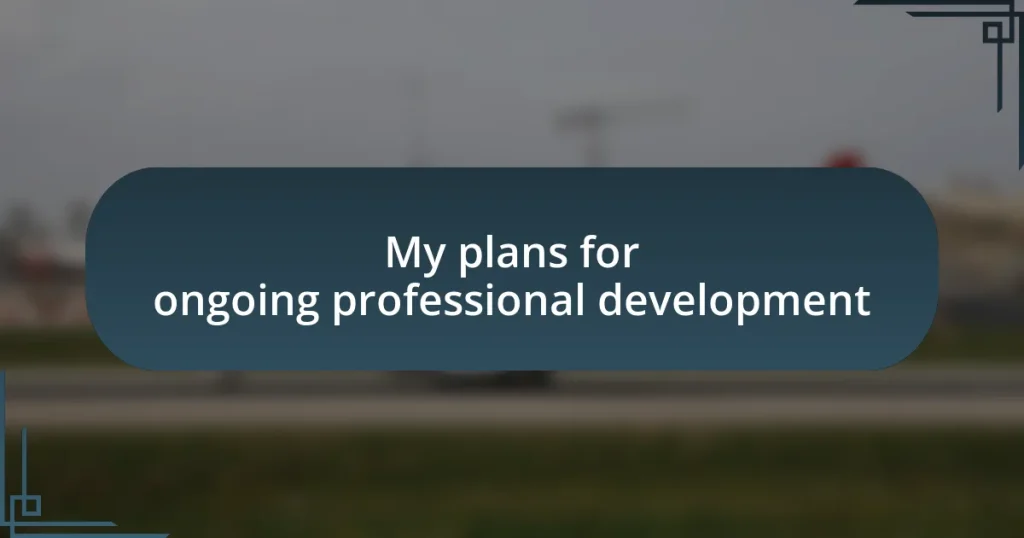Key takeaways:
- Professional development is a continuous journey focused on personal growth, networking, and mentorship.
- Setting clear, measurable goals and timelines helps in maintaining accountability and motivation throughout the development process.
- Engaging with mentors or coaches provides valuable insights and structured guidance, enhancing the learning experience.
- Regularly evaluating progress and adjusting plans is crucial for aligning development efforts with career goals.
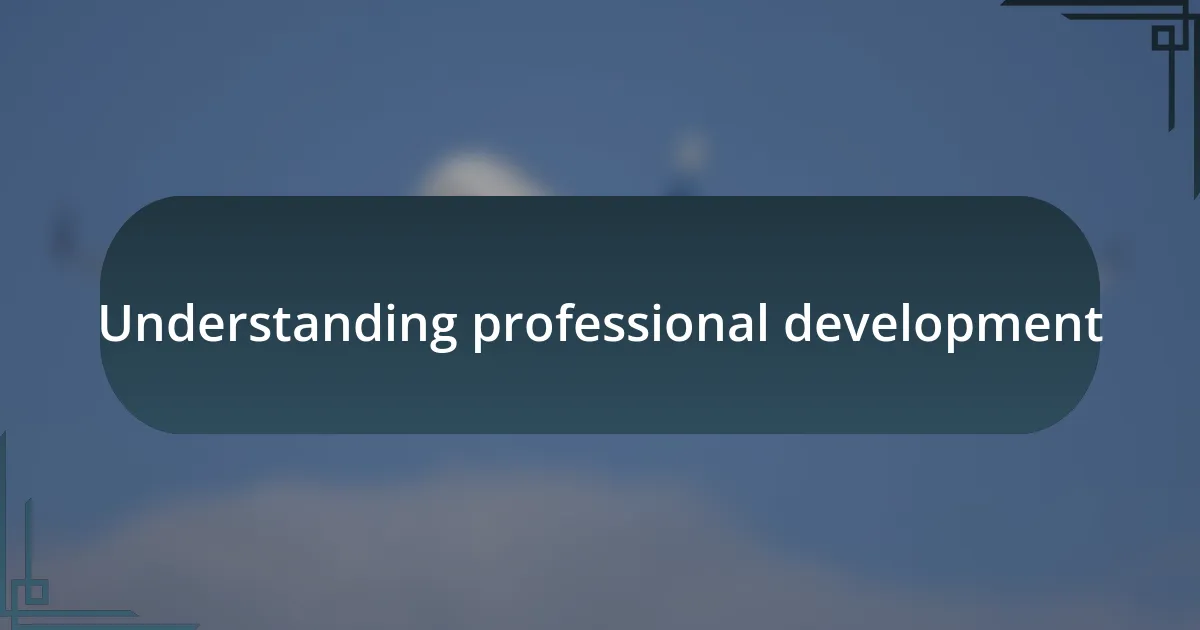
Understanding professional development
Professional development is more than just attending workshops or completing online courses; it’s a commitment to continuous improvement in one’s career. I remember when I first recognized this idea during a particularly challenging project at work. I found myself asking, “What skills could I develop to handle this better?” That moment sparked my journey toward embracing lifelong learning.
It’s essential to understand that professional development is tailored to individual goals and experiences. For instance, I once took a seminar on public speaking, but what I gained was much more than just better delivery. The connections I made and the feedback I received transformed my perspective on collaboration. Isn’t it fascinating how stepping out of your comfort zone can lead to unforeseen opportunities?
Moreover, professional development encourages networking and mentorship, creating a community for growth. I often reflect on the mentors I have had who guided me, providing insights I couldn’t have gained alone. How important is it to cultivate those relationships? In my experience, they are invaluable; they not only boost confidence but also open doors to new pathways in our careers.

Identifying personal career goals
Identifying personal career goals requires introspection and clarity about what truly matters in your professional journey. I recall a time when I felt lost in my career, unsure of which direction to take. During this period, I started journaling my thoughts and aspirations, which ultimately illuminated my path. This process taught me that taking the time to reflect on what I genuinely wanted was the foundation for setting meaningful goals.
To help with this introspection, I recommend considering the following:
- Evaluate your current skills and identify areas for improvement.
- Think about what aspects of your job bring you joy and fulfillment.
- Set specific, measurable, achievable, relevant, and time-bound (SMART) goals.
- Visualize where you want to see yourself in five or ten years.
- Seek feedback from trusted colleagues about your strengths and areas for growth.
Finding clarity in your career objectives can be enlightening, transforming uncertainty into a clear action plan.
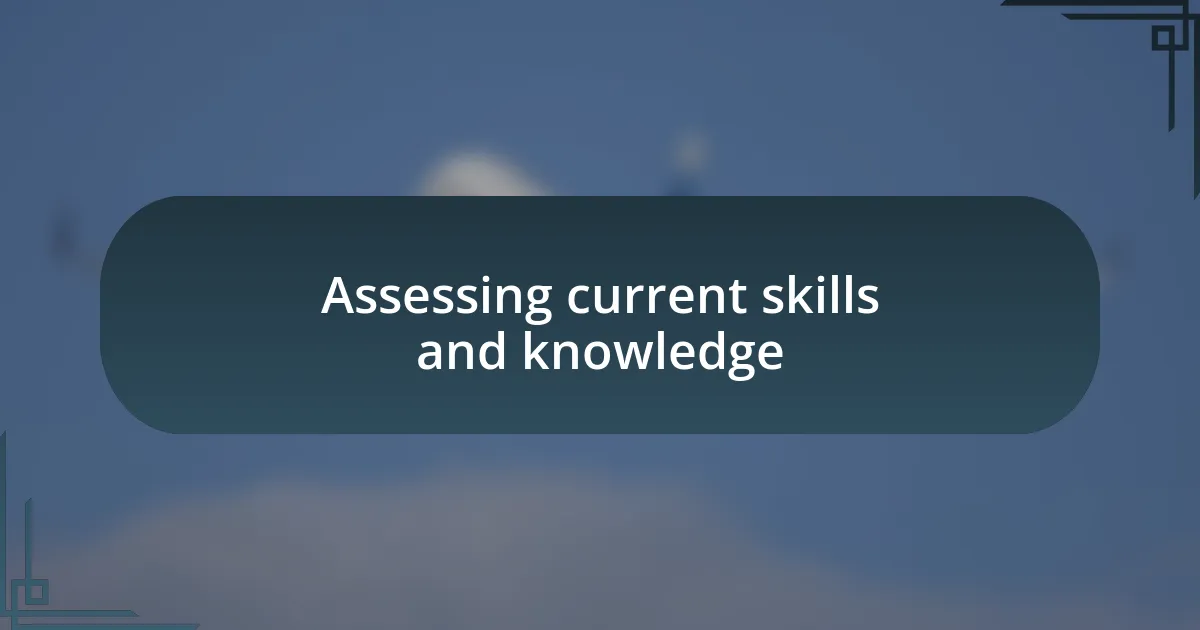
Assessing current skills and knowledge
Assessing current skills and knowledge is a crucial step in my professional development journey. I often find myself reflecting on what I’ve learned throughout my career and identifying the gaps that still exist. For instance, I once conducted a self-assessment that revealed my proficiency in technical skills but highlighted my need for leadership training. This realization pushed me to seek out courses that could strengthen my competencies in management.
I believe that creating a skills inventory can be incredibly beneficial. By categorizing my abilities into technical, interpersonal, and conceptual domains, I’ve been able to visualize where I stand in each area. Additionally, I frequently consult with colleagues during feedback sessions. I once had a coworker who provided insight into my communication style, which I had never considered before. Their perspective helped me recognize the nuances I could improve, leading to enhanced collaboration.
Moreover, using tools like self-assessment questionnaires or peer evaluations can provide a broader perspective on one’s abilities. It’s fascinating how input from others can highlight strengths you may take for granted. Reflecting on these insights motivates me to set targeted goals for growth, ensuring that I actively work towards enhancing my skill set.
| Skills and Knowledge | Self-Assessment Techniques |
|---|---|
| Technical Skills | Self-Reflection Journals |
| Interpersonal Skills | Peer Feedback Sessions |
| Conceptual Skills | Competency Frameworks |
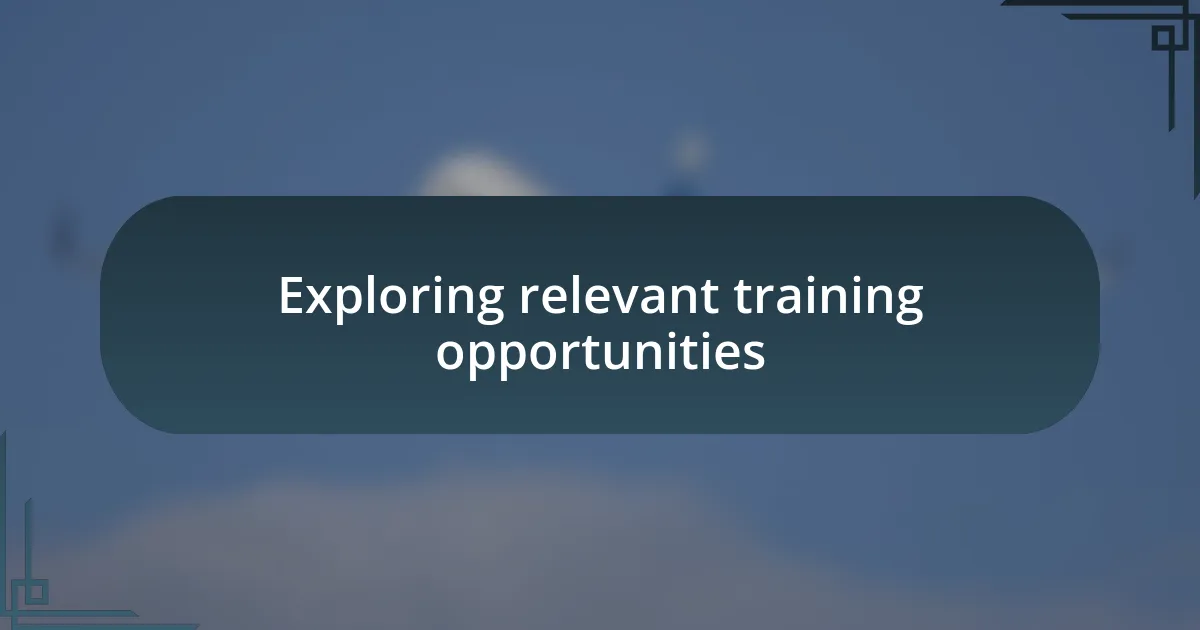
Exploring relevant training opportunities
Exploring relevant training opportunities often feels like diving into a vast ocean of possibilities. I remember when I first started looking into certifications; it was overwhelming to see the sheer number available. One day, a mentor suggested focusing on courses directly aligned with my career goals rather than trying to sample everything. This guidance shifted my perspective, making the search more targeted and less daunting.
I find that online platforms can be goldmines for training opportunities. For example, I once enrolled in a digital marketing course that transformed my understanding of SEO. The flexibility of studying at my own pace allowed me to absorb the material deeply. Have you ever sought out training that just clicked with you in a way that changed your whole approach? That course did for me; it felt less like a chore and more like an exciting adventure into a new realm.
Additionally, attending workshops and conferences can offer hands-on experiences that online courses might miss. I recall attending a leadership workshop where role-playing scenarios brought theoretical concepts to life. Engaging in discussions with peers not only broadened my understanding but also ignited a passion for leadership that I hadn’t fully recognized in myself. It made me realize that sometimes, the best learning happens outside of traditional settings.
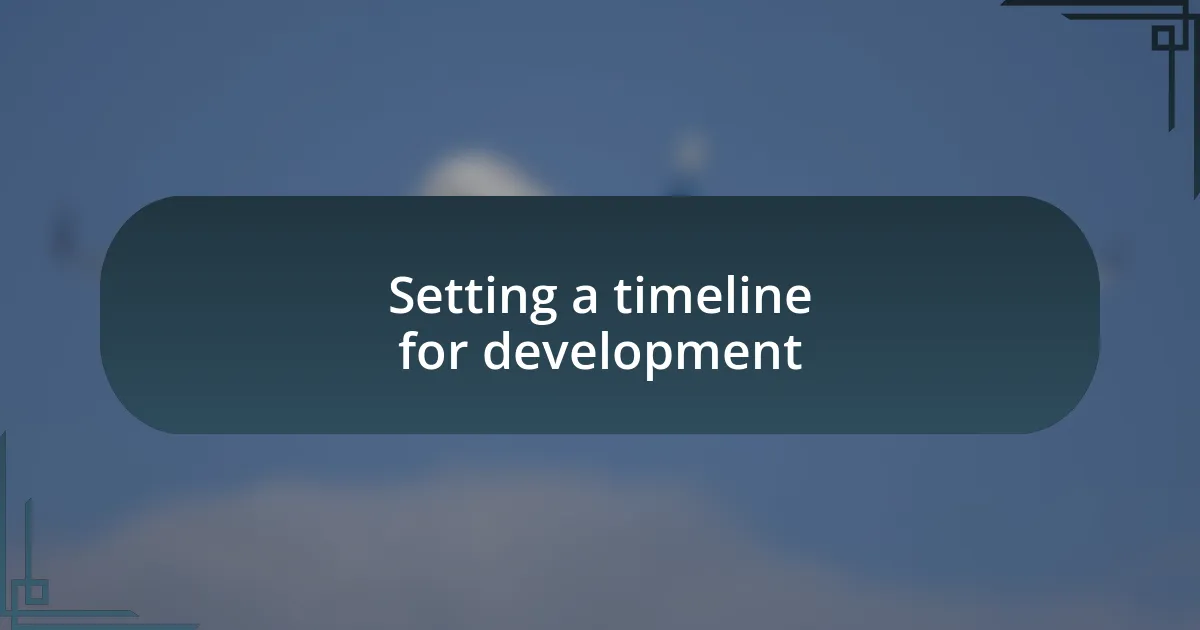
Setting a timeline for development
When I think about setting a timeline for my professional development, I often reflect on my own experiences. Establishing specific timeframes helps me stay accountable and motivated. For instance, I once committed to completing a certification by the end of a quarter, and having that deadline made me prioritize my study time effectively.
Breaking down larger goals into monthly or weekly milestones can be incredibly beneficial. I remember tackling an advanced project management course where I set weekly targets for each module. This approach not only reduced the feeling of being overwhelmed but also gave me frequent achievements to celebrate. Have you ever felt that rush when you check a goal off your list? It’s fantastic and keeps the momentum going.
Moreover, flexibility is crucial when setting timelines. Life can be unpredictable, and I learned the hard way that rigid deadlines can lead to unnecessary stress. During another development project, I had to adjust my timeline to accommodate unexpected work demands. By allowing some wiggle room, I remained committed to my growth without feeling like I had to choose between my job and my development. How do you balance your plans with life’s unpredictability? It’s all about adaptability for me; recognizing that adjustments are just part of the journey helps me stay focused on my growth.
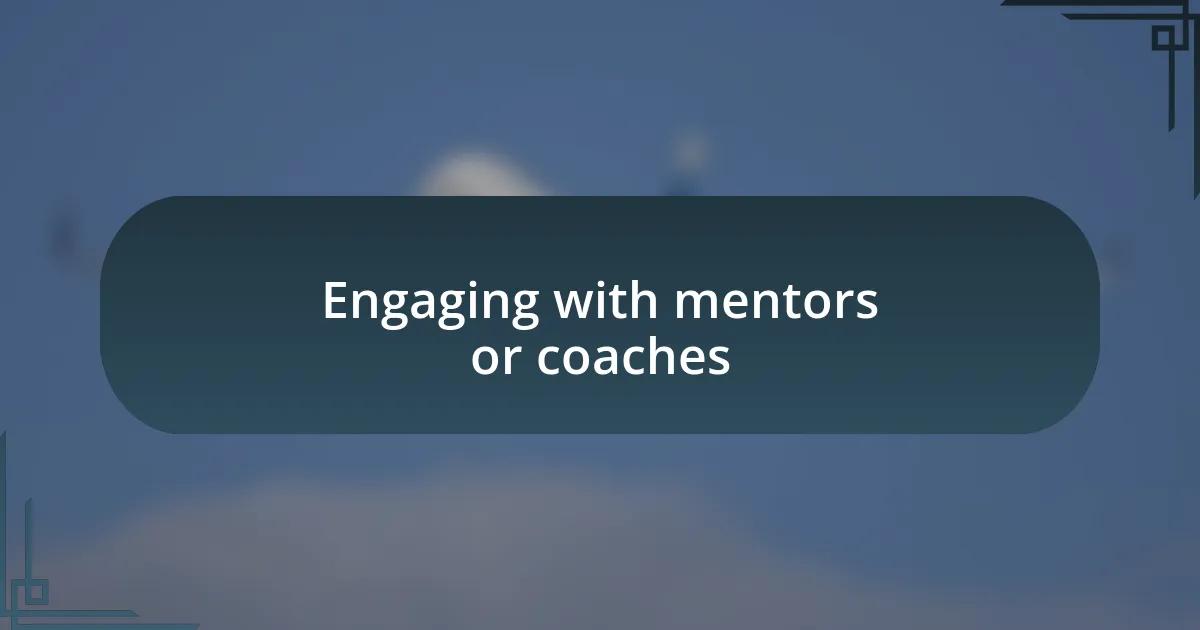
Engaging with mentors or coaches
Engaging with mentors or coaches can dramatically influence my professional growth. I remember the first time I sought out a mentor in my industry; it was like gaining a new perspective on my career. They challenged my thinking and provided insights I had never considered before. Have you ever experienced that moment when someone opens your eyes to possibilities you hadn’t acknowledged? It’s immensely empowering.
Coaching can offer structured guidance that’s tailored to my unique needs. I once worked with a coach who helped me identify my strengths and areas for improvement through a series of focused sessions. This personalized approach made me feel valued and understood, which, in turn, motivated me to push past my limits. Have you thought about what makes a coaching relationship effective? For me, it’s all about that genuine connection and trust, which fosters an environment where growth can thrive.
Additionally, I’ve found that maintaining an ongoing relationship with a mentor or coach keeps the momentum of my development going. After our initial meetings, I made it a point to check in regularly, sharing updates on my progress and receiving feedback. It’s like having a dedicated partner in my journey—someone who holds me accountable and celebrates my victories. Have you considered how regular check-ins might enhance your growth? By staying connected, I ensure that my development remains a continuous conversation, rather than a one-time event.
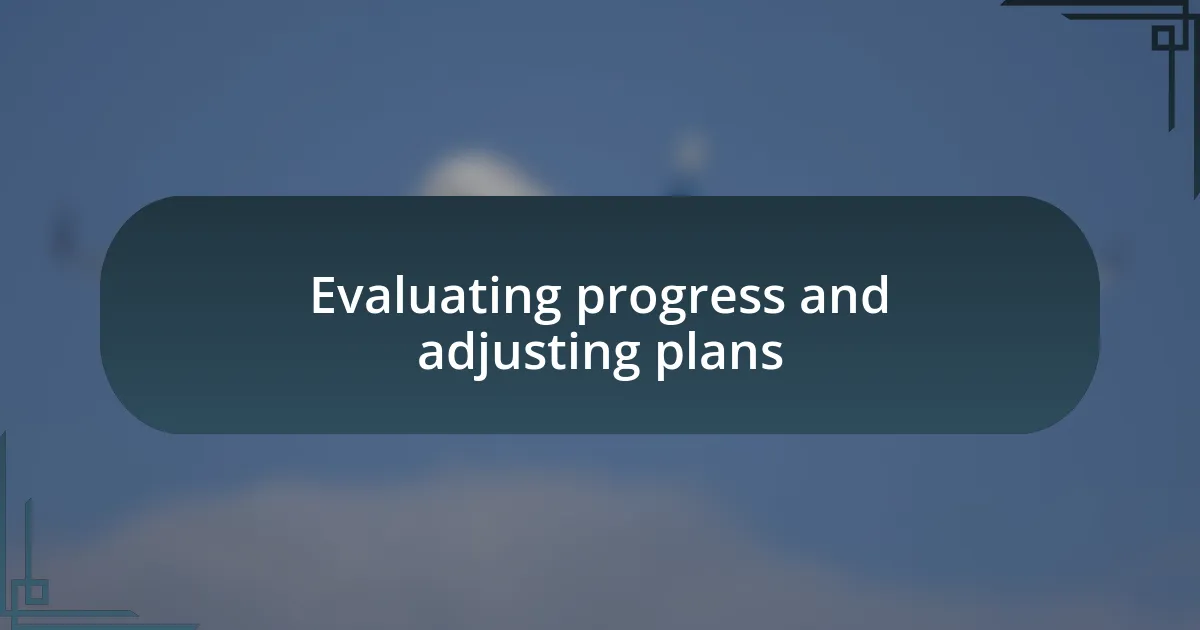
Evaluating progress and adjusting plans
Evaluating my progress is essential to ensure that I stay aligned with my professional goals. I remember when I set a goal to improve my public speaking skills. After a few months, I recorded myself delivering a presentation and was shocked to notice my own nervous habits. That self-reflection was eye-opening and made me rethink my approach. Have you ever watched yourself in action and learned something surprising?
Adjusting my plans has become a vital part of my development journey. For instance, I initially thought attending workshops would be my best path to growth. However, after attending a couple, I realized that applying what I learned in real-world scenarios was far more beneficial. So, I shifted my focus to more hands-on experiences. How often do you reassess your learning methods to discover what truly works for you?
Finding a balance between setting new challenges and acknowledging my progress is key. I like to keep a journal where I note down my achievements, no matter how small. Reflecting on these moments fuels my motivation, and when I hit a plateau, I can look back and realize how far I’ve come. Do you track your successes, and how does that impact your confidence?











